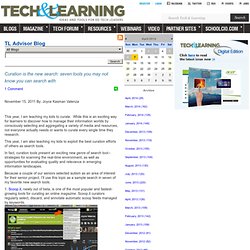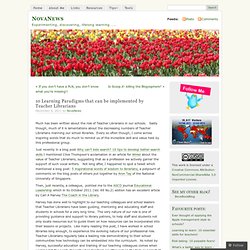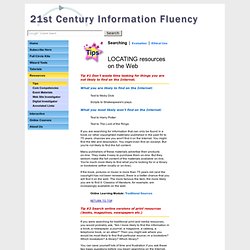

Developing Digital Literacy. - Curation is the new search: seven tools you may not know you can search with. 1 Comment November 15, 2011 By: Joyce Kasman Valenza Nov 14 Written by: 11/14/2011 5:38 PM ShareThis This year, I am teaching my kids to curate.

This year, I am also teaching my kids to exploit the best curation efforts of others as search tools. In fact, curation tools present an exciting new genre of search tool--strategies for scanning the real-time environment, as well as opportunities for evaluating quality and relevance in emerging information landscapes. Because a couple of our seniors selected autism as an area of interest for their senior project, I’ll use this topic as a sample search in seven of my favorite new search tools. 1.
The little green box listing Scoop.it Score is a metric for measuring topic quality based on dynamism, depth, and audience engagement. Students might search Scoop.it’s Search page or browse through Scoop.it’s Awesome Topics page and scan topics listed with Tops Scores, Trending, Featured, and Popular. 3. 3. 4. 5. 6. - Ten Items All Should Know When Using Google Basic Search…. Far From Basic! by Michael Gorman. The Basic Search – The Google Basic Search is usually the first place most people begin a search and it is also the last place they end.

Many times students just type in some words and get lost in millions of results trying to find an answer. Impressed by the number of hits they get, many times they forget that the art of searching is getting fewer results with relevant answers. I would like to share with you ten important concepts to think about in getting optimal searches from the Google basic search engine. Print this off and hand out to others. It really is the very basic in using Google. Ten Items All Should Know When Using Google Basic Search…. NovaNews. December 6, 2011 by NovaNews Much has been written about the role of Teacher Librarians in our schools.

Sadly though, much of it is lamentations about the decreasing numbers of Teacher Librarians manning our school libraries. Every so often though, I come across inspiring words that do much to remind us of the incredible skill and value held by this professional group. Just recently in a blog post Why can’t kids search? 10 tips to develop better search skills I mentioned Clive Thompson’s acclamation in an article for Wired about the value of Teacher Librarians, suggesting that as a profession we actively garner the support of such vocal writers.
Then, just recently, a colleague, pointed me to the ASCD journal Educational Leadership which in its October 2011 (Vol. 69 No.2) edition has an excellent article by Carl A Harvey The Coach in the Library. I concur totally with Harvey when he suggests that the best professional learning occurs in small focused groups. Like this: Like Loading... In the wild. Big6 research. Comprehensive list of Search Engines - The Search Engine List. Information fluency search tips. Searching Tip #1 Don't waste time looking for things you are not likely to find on the Internet.

What you are likely to find on the Internet: Text to Moby Dick Scripts to Shakespeare's plays What you most likely won't find on the Internet: Text to Harry Potter Text to The Lord of the Rings If you are searching for information that can only be found in a book (or other copyrighted materials) published in the past 50 to 75 years, chances are you won't find it on the Internet. Many publishers of these materials advertise their products on-line. If the book, pictures or music is more than 75 years old (and the copyright has not been renewed), there is a better chance that you will find it on the web. Online Learning Module: Traditional Sources RETURN TO TOP Tip #2 Search online versions of print resources (books, magazines, newspapers etc.) You can save yourself lots of time and frustration if you ask these two basic questions before you begin searching on the Internet.
How do I refine my search? Information fluency home.